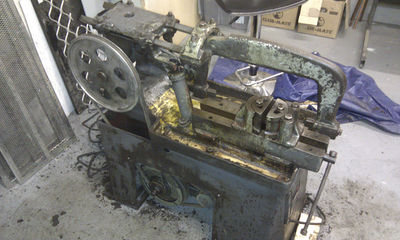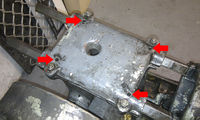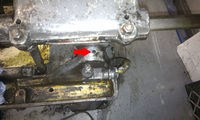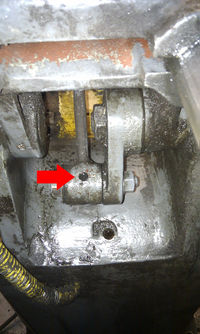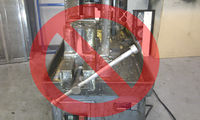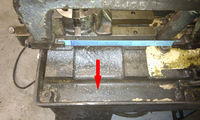Equipment/Donkey Saw
| Donkey Saw (Rapidor Major) | |
|---|---|
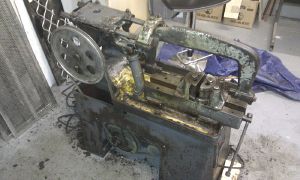 | |
| Model | Rapidor Major |
| Sub-category | Metalworking |
| Status | Good working order |
| Last updated | 21 January 2022 12:56:11 |
| Consumables | Blades, Oil, Cutting Fluid |
| Accessories | Unknown |
| Training requirement | no |
| Training link | Unknown |
| ACnode | no |
| Owner | London Hackspace |
| Origin | Pledge:_Donkey_Saw |
| Location | Metalworking shop |
| Maintainers | yetifiasco |
Types of Materials it can Cut
- All iron/steel tube/box section
- All iron/steel rod/bar
- Larger aluminium tube/box section
- Larger aluminium rod/bar
- Non-ferrous rod/bar (NOT copper piping)
Types of Materials it CANNOT Cut
- ANY plate material, only a few teeth catch during the cut and there is a high chance of snapping the blade
- Small aluminium rod/bar/tube/box section, the saw is too heavy duty and will mangle the piece
- Copper piping for the above reasons
- Wood
- Plastic
Before Use
- Check the machine is stable and doesn't wobble
- Brush swarf from the clamping area
- Add oil to all oil holes with oil can
- Put a few drips of oil on the runners
Clamping
- Lift the saw arm up and prop it using the connected metal bar
- Set the vice to the correct angle using a 21mm spanner and a set square/angle gauge against the saws blade
- Clamp the job firmly, make sure it is level against the vice bed and any excess is supported
- GENTLY lower the saw arm back down until it is resting on the job, making sure the metal prop bar has fallen back in its slot - Shock absorber now fixed, arm will lower slowly by itself when dropped
- IMPORTANT: Make sure the vice handle is out of the way of the saw and will not fall in front of the saw whilst in use, this is the only way to machine can really be damaged
During Cutting
- Keep the cutting area well lubricated with oil throughout
- DO NOT PRESS DOWN ON THE SAW ARM, this will not make it cut faster, it will only stress the blade and strain the motor, potentially breaking both
- Once the cut is complete, the saw should automatically turn off, if it doesn't, turn off the saw using the stop button and contact either YetiFiasco or paddyd on IRC
After Cutting
- Clean any metal swarf from the vice beds, vice head and screw thread
- Brush any metal swarf from beneath the blade to the trays at the side
- If the trays are full, scoop them out using a scraper
- Apply a light coat of oil to the vice bed if it is dry
- Make sure you leave the saw lowered
Supplies
Blades are impossible to find online in the UK, so we order them from Caulfield Industrial in Ireland.
- http://www.caulfieldindustrial.com/starrett--power-hacksaw-blades/p-225967pd.html
- Model is RS14108-5
Log
Update: 5-7-2014 - Padski - Back in operation.
Update: 19 June 2014 - Liam The donkey saw is out of service until some TLC can be drizzled over it. I've taken the lay shaft away for some attention and a clean up. The lay shaft had siezed. It needs a lock nut and a clean up. However, the main bearings in it are pretty shot. Thats why the belts were so tight, because thats holding it together. I will see if they are journal bearings and if something better can be gone, or it clean, fix the layshaft and put it back together. It is a very old donkey.
Update: 20 Aug 2013 - Liam Lynch - cut and drilled new tensioner bar for the free end of the blade mounting. Fitted new blade and tested. Working OK. 5mm wall 50mm scaffold pole cut through in <20s!
Needs:
- New mains cable, mounted in steel conduit and cut to length (Work can fall on and damage the present cable).
- Emergency stop mushroom in power feed on wall.
- Cage or guard needs fabricating for the top belt pulley, both sides of main machine
- Floor levelling and machine needs bolting down.
- Extra work rest needs fabricating to support longer work pieces.
Maintenance
If the saw doesn't stop when its cut right through the cutting object.
1. Undo the locking nut on the screw (I used an adjustable spanner - I think it's an Imperial size nut).
2. WIth the saw running (but not cutting anything (i.e. FULLY DOWN - Don't worry - it won't harm the saw), slowly screw the screw in, until the saw stops.
3. Turn the screw another 1/4 turn, and then (keeping the screwdriver in it, to prevent it moving) tighten the lock nut again.
4. Test! If it doesn't work, repeat...
